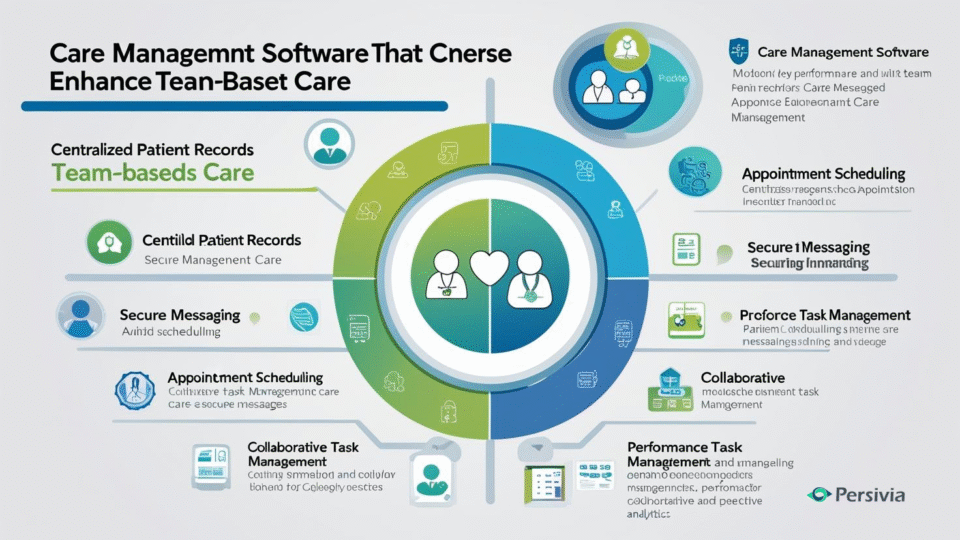
Care Management Software Features That Enhance Team-Based Care
Clinical teams may provide coordinated, data-driven, and effective care with the use of contemporary care management software. Treatment teams can cut down on administrative work, eliminate treatment gaps more quickly, and maintain alignment with value-based goals by utilizing solutions like telehealth integration, automated insights, centralized patient data, and risk stratification.
Improving the collaboration of care teams is the first step towards improving patient outcomes. In the modern healthcare setting, teamwork is still crucial. To support that effort, many high-performing organizations are turning to Care Management Software that assists clinicians and lessens fragmentation throughout the care continuum. Using the appropriate technology has become essential to provide efficient team-based care as patient needs become more complicated and time and resource demands increase.
The most advanced platforms go far beyond digital documentation. They serve as intelligent systems that facilitate easy communication, fast data availability, and appropriate therapeutic action by each team member. These solutions facilitate dynamic, coordinated workflows that span across inpatient, outpatient, and virtual care contexts, and they are built on the foundation of a digital health platform.
Why Team-Based Care Needs Stronger Software Support
In order to provide collaborative care, it is necessary to coordinate various tasks, manage ongoing data inputs, and ensure that nothing is overlooked. Care teams must deal with monotonous activities, make decisions without context, and waste time hopping between systems in the absence of centralized systems. That affects both care quality and outcomes.
This is where modern care management software changes the game. With smart workflows, connected data, and automation, these platforms bring structure and clarity to care delivery.
What Makes A Platform Team-Ready
The shift toward collaborative care requires more than team meetings and shared goals; it requires structured technology that brings everyone onto the same page. Scattered tools slow progress. But unified platforms help streamline each step, from initial risk assessment to final care plan documentation.
With the right digital infrastructure, clinical teams gain not only visibility but also context, knowing what action to take and when. The features below help define a platform truly built for integrated care.
-
Centralized Patient Records
Managing care becomes easier when every provider sees the same record. These platforms combine wearable, social, clinical, claims, and patient-reported data into a single longitudinal picture. The same source of truth is available to all team members in real time.
-
Insight Generation
Platforms analyze unstructured and structured data to give actionable insights at the point of care. Clinical teams spend less time digging and more time doing.
-
Personalized Care Plans
Each patient gets a unique care path based on specific needs. Configurable care plans pull from real data, adjusting to clinical history, social factors, and reported outcomes.
Features That Boost Collaborative Efficiency
To support care teams effectively, a platform must do more than store data. It should actively contribute to decision-making, reduce redundancies, and ensure interventions are clinically aligned. These capabilities are key to streamlining coordination and boosting efficiency across care roles.
-
Built-In Evidence Rules
Thousands of rules and hundreds of pathways make sure care aligns with the latest clinical standards.
-
Real-Time Interventions
At the point of care, providers get context-aware prompts with suggested actions. These recommendations match patient conditions and known gaps in care.
-
Multi-Channel Communication
Connecting with patients is made simple with text, video, and audio chat tools. These tools enhance coordination and reduce delays.
Smart Use of Data
Many care platforms are inadequate when it comes to putting data into action. Information gathering is insufficient on its own; teams require real-time tools for interpretation, prioritization, and intervention guidance. This is where advanced data usage becomes a critical asset.
-
Risk Stratification: Care teams can rank patients according to real risk rather than conjecture by combining clinical, claims, and social data. This helps in allocating resources better.
-
Gap Identification: Platforms flag care gaps in real time. Depending on the needs of each value-based care program, these may be clinical, procedural, or service-related.
-
Utilization and Cost Tracking: Care managers can learn about trends in total service utilization and cost thanks to built-in analytics. This supports preventive action before high costs hit.
Integrated Workflows
Effective care management doesn’t end with insight. It depends on seamless execution. That means every tool, system, and task must work together without creating friction for the care team. Integrated workflows allow healthcare organizations to embed intelligent support into daily routines.
-
EHR and Operations Sync
Platforms work with existing workflows without disruption. Teams avoid redundant data entry and stay in their preferred systems.
-
Prioritized Task Management
Care managers get tools to organize their work based on urgency, patient condition, and system flags. This minimizes delay and spreads effort evenly.
-
Remote Access and Telehealth
Video consults, billing tools, and virtual assessment support make care delivery location-flexible without losing track of documentation or billing.
Impact in Numbers
- 65% reduction in all-cause 30-day readmission rate
- An 85% drop in provider workload through smarter workflow
- 9,000+ evidence rules baked into the system
- 200+ built-in care pathways for various specialties
These results show how proper platform use improves both team efficiency and patient outcomes.
The Value of a Flexible Foundation
A system built on a reliable Digital Health Platform enables real-time learning, continuous improvement, and seamless care transitions. This kind of foundation supports evolving clinical demands without needing to overhaul existing systems.
Final Thoughts
Consistency, cooperation, and prompt action are essential components of team-based care. When teams have access to the appropriate digital tools, they can concentrate on patients rather than paperwork. Every team member performs at their highest level when workflows are more intelligent, communication is improved, and decision assistance is integrated.
Explore the Power Behind These Results
Behind every smart, structured care model is a platform built for performance. Persivia CareSpace® offers these capabilities and more. As one of the leading care management software vendors, it supports care delivery that scales across populations, programs, and teams. It’s also ranked among the Best Care Management Software options for providers aiming to thrive in value-based care.








